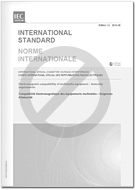
IEC 60335-2-120:2024 EXV
Household and similar electrical appliances - Safety - Part 2-120: Particular requirements for the safety of appliances for the generation of directly inhalable aerosols
Ausgabedatum:
2024-02
Edition:
1.0
Sprache: EN - englisch
Seitenzahl: 246 VDE-Artnr.: 252540
IEC 60335-2-120:2024 EXV contains both the international standard and its extended version (EXV). This extended version of the official IEC Standard is available in English only and provides the user with a comprehensive content of the Standard. IEC 60335-2-120:2024 EXV includes the content of the references made to IEC 60335-1:2020.
IEC 603352-120:2024 deals with the safety of appliances for generation of directly inhalable aerosols, their rated voltage being not more than 250 V for single-phase appliances, and other appliances including direct current (DC) supplied appliances and battery-operated appliances.
Examples of the appliances that are within the scope of this standard are:
- vapour and aerosol appliances;
- personal vaping appliances with or without nicotine;
- electronic cigarettes;
- electronic nicotine delivery systems (ENDS);
- electronic non-nicotine delivery systems (ENNDS);
- electronic tobacco heating appliances for heated tobacco products.
This standard does not apply to:
- medical ventilators,
- humidifiers (IEC 60335-2-98).
These requirements do not cover the consumables, such as e-liquids and other inhaled aerosol substances, wicks, and other particulate matter inhaled during use, nor do they cover substances in the emissions from the operation of the appliances. For example, heavy metal emissions in the aerosol and environmental exposure are not covered by this standard. These requirements do not consider the physiological effects of any consumable used with the appliances. This International Standard does not cover requirements or prohibitions of the labelling, packaging and contents of nicotine-containing or nicotine-consuming products that are strictly regulated by law of the relevant jurisdiction.

